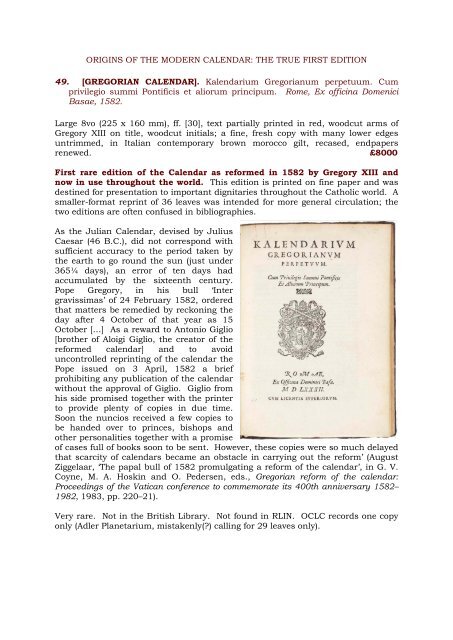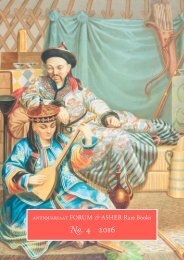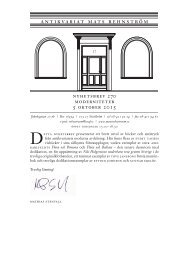ORIGINS OF THE MODERN CALENDAR: THE TRUE FIRST EDITION49. [GREGORIAN CALENDAR]. Kalendarium Gregorianum perpetuum. Cumprivilegio summi Pontificis et aliorum principum. Rome, Ex officina DomeniciBasae, 1582.Large 8vo (225 x 160 mm), ff. [30], text partially printed in red, woodcut arms ofGregory XIII on title, woodcut initials; a fine, fresh copy with many lower edgesuntrimmed, in Italian contemporary brown morocco gilt, recased, endpapersrenewed. £8000First rare edition of the Calendar as reformed in 1582 by Gregory XIII andnow in use throughout the world. This edition is printed on fine paper and wasdestined for presentation to important dignitaries throughout the Catholic world. Asmaller-format reprint of 36 leaves was intended for more general circulation; thetwo editions are often confused in bibliographies.As the Julian Calendar, devised by JuliusCaesar (46 B.C.), did not correspond withsufficient accuracy to the period taken bythe earth to go round the sun (just under365¼ days), an error of ten days hadaccumulated by the sixteenth century.Pope Gregory, in his bull ‘Intergravissimas’ of 24 February 1582, orderedthat matters be remedied by reckoning theday after 4 October of that year as 15October […] As a reward to Antonio Giglio[brother of Aloigi Giglio, the creator of thereformed calendar] and to avoiduncontrolled reprinting of the calendar thePope issued on 3 April, 1582 a briefprohibiting any publication of the calendarwithout the approval of Giglio. Giglio fromhis side promised together with the printerto provide plenty of copies in due time.Soon the nuncios received a few copies tobe handed over to princes, bishops andother personalities together with a promiseof cases full of books soon to be sent. However, these copies were so much delayedthat scarcity of calendars became an obstacle in carrying out the reform’ (AugustZiggelaar, ‘The papal bull of 1582 promulgating a reform of the calendar’, in G. V.Coyne, M. A. Hoskin and O. Pedersen, eds., Gregorian reform of the calendar:Proceedings of the Vatican conference to commemorate its 400th anniversary 1582–1982, 1983, pp. 220–21).Very rare. Not in the British Library. Not found in RLIN. OCLC records one copyonly (Adler Planetarium, mistakenly(?) calling for 29 leaves only).
50. GRIBOEDOV, Aleksandr Sergeevich. Gore ot uma, komediia v chetyrekhdeistviiakh, v stikhakh. Vtoroe polnoe (ispravlennoe) izdanie, Nikolaia Tiblena[Woe from wit. A comedy in four acts, in verse. Second complete (corrected)edition, by Nikolai Tiblen …]. St Petersburg, [N. Tiblen,] 1862.8vo, pp. 97 + 1 page errata; occasional light browning, some light water-staining tomargins, but generally a very good copy, uncut in the original printed wrappers,worn, spine repaired, Russian booksellers’ stamps to inside back wrapper, oldsignature to front cover and title; in a folding cloth box. £1800Second, corrected edition of the first complete printing of Gore ot uma in Russia; inthe rare original printed wrappers. A note at the end states that the errors in thefirst complete edition (also 1862) have been corrected here, but that the presentedition also has a few errors, corrected in the ‘errata’ at the end.The first edition of Griboedov’s great play, published in Moscow in 1833, hadsubstantial cuts. According to Piksanov, it was shortly followed by a couple ofpiracies of the ‘full’ text, but it is not known how many of those were printed andwhat sort of circulation they achieved; only a single copy is known of each. In1858, two German editions were published, by Gustav Baer in Leipzig andFerdinand Schneider in Berlin; both are rare. It took another four years before thecomplete text appeared in Russia.This edition not in Kilgour. OCLC lists copies at Stanford and Basel only.51. GRIFFITHS, Anselm John. Observations on some Points of Seamanship;with Practical Hints on Naval Oeconomy. Cheltenham, printed by J.J. Hadley,1824.8vo, pp. xii, 290; occasional, very light spotting; a very good copy, in contemporarystraight-grained blue morocco gilt, broad borders of gilt palmette rolls enclosingblind rolls, spine gilt in compartments, lettered directly in 2, all edges gilt,extremities slightly rubbed and bumped; engraved armorial bookplate ‘Mansel’,probably that of Captain Robert Mansell (1786-1845) who, according to the list ofsubscribers on p. 284, received three copies; bookseller’s ticket of Williams ofCheltenham to front pastedown. £1200First edition. The Observations was written in 1811 when the author was captainof the Leonidas frigate and is based on his experience of a wartime navy during theNapoleonic Wars. ‘As its title suggests, the book is mainly concerned with mattersof seamanship but contains many notes on ship organisation [...]. The chapter on“Conduct of the ship’s company” ranges over many issues and is perhaps the mosthumane and liberal of all the documents which have emerged from the period.Perhaps this is because the bitterness caused by the great wave of mutiniesculminating in 1797 had died down and officers such as Griffiths were able toconsider ways to keep up morale for the future. Certainly the book can be seen aspart of a general humanisation of the Navy after about 1805, with many smallreforms such as the abolition of running the gauntlet and starting and theregularisation of the position of the caplain on board ship’ (B. Lavery, ed.,Shipboard Life and Organisation 1731-1815, pp. 255-256).
- Page 1 and 2: BERNARD QUARITCHOLYMPIA 201528th -
- Page 3 and 4: 1. ADAMS, Robert. What we bought: t
- Page 5 and 6: chipped; wanting free endpapers; bo
- Page 7 and 8: HAND-COLOURED PLATES BY MULREADY7.
- Page 9 and 10: ‘A NEW DEPARTURE’ (SCHUMPETER)1
- Page 11 and 12: First editions thus of two lectures
- Page 13 and 14: THE FIRST EDITION WITH MAPS18. CAMD
- Page 15 and 16: Grafton) exercise in self-scrutiny
- Page 17 and 18: Houlston edition, rare; MERRY ANDRE
- Page 19 and 20: Western Indian Ocean (1878-1882). T
- Page 21 and 22: Rare in commerce: Anglo-American au
- Page 23 and 24: 34. DEAKIN, John. London Today: a s
- Page 25 and 26: edges, two corners worn, spines dec
- Page 27 and 28: THE ARCHIVE OF A CARTOONIST, WITH A
- Page 29 and 30: MANUSCRIPT LETTER ON THE AMERICAN P
- Page 31: THE FIRST DETAILED HISTORY OF MONEY
- Page 35 and 36: 8vo, pp.[xii], 398; light foxing to
- Page 37 and 38: half-tone illustrations recto-and-v
- Page 39 and 40: Philosophy from 1928 to 1960, after
- Page 41 and 42: MERCANTILE ACCOUNTANCYANNOTATED IN
- Page 43 and 44: PARIS WINDOWS, IN MAQUETTES & PHOTO
- Page 45 and 46: 68. LEIBNIZ, Gottfried Wilhelm. Oeu
- Page 47 and 48: 71. [LOCKE, John.] An Essay concern
- Page 49 and 50: 73. LOSTELNEAU, Colbert de. Le mare
- Page 51 and 52: THE FIRST MODERN WORK ON ECOLOGYA C
- Page 53 and 54: livres rares, Paris, 1871, n. 215),
- Page 55 and 56: [With, loosely inserted:]C.T. NEWTO
- Page 57 and 58: THE TASTE FOR PRE-RENAISSANCE PAINT
- Page 59 and 60: CONTEMPORARY ENGLISH GILT BINDING90
- Page 61 and 62: THE HISTORY OF THE WORLD92. RALEGH,
- Page 63 and 64: Clermont in 1869-70 and 1870-72, No
- Page 65 and 66: THE MERRY WIVES OF DUBLIN99. SHAKES
- Page 67 and 68: The finest surviving example of Ski
- Page 69 and 70: WITH THE RARE SUITE OF HAND-COLOURE
- Page 71 and 72: ‘No less exciting is the Tafereel
- Page 73 and 74: 110. TERENCE. Publii Terentii comoe
- Page 75 and 76: ecomes increasingly intoxicated by
- Page 77 and 78: The pastedowns are from a manuscrip
- Page 79 and 80: volume VI, an early contribution by





